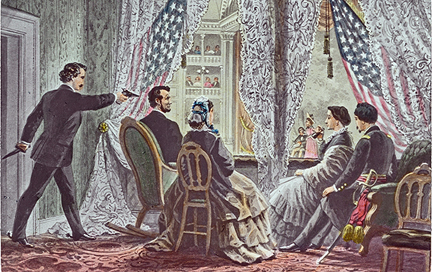
On this day, April 14, 1865, President Abraham Lincoln was mortally
wounded while watching a play in Ford’s Theater. Much has been written about
that fateful event. It was a day that changed the presidency and all of America
from that point forward. In an attempt to overthrow the power structure of the
United States and help the South to rise from recent defeat – Lee had
surrendered just five days earlier - John Wilkes Booth killed the president.
But in causing the death of the man he thought to be a tyrant (he shouted the
Latin phrase "sic semper tyrannus” after shooting Lincoln), Booth actually
caused Lincoln to be seen as a great martyr and hero for the cause of freedom.
He is typically picked as the greatest president to have ever served our
country. This was not what Booth had in mind when he decided to put a bullet in
Lincoln’s head. Nor was it the thinking of others who had tried the same thing.
Booth’s assault on President Lincoln was not the first time
someone had attempted to take his life. In fact, there had been four other
assassination attempts made on Lincoln prior to the shooting at Ford’s Theater.
The first was a plot for a mob in Baltimore to cause a diversion to attract the
attention of the police while the presidential train was on its way to
Washington D.C. for his inauguration. While the mob caused a ruckus, others
would rush his train car and knife him to death. This was to happen on February
23, 1861. Tipped off by the plot, the
authorities took the Lincoln’s through Baltimore in the middle of the night by
special train.
The second attempt happened on July 2, 1864. While visiting
Fort Stevens outside of Washington D.C., a sniper fired at the president,
hitting the man next to Lincoln in the leg.
A third attempt happened just weeks later while he was
riding his horse just outside of Washington. Someone took a shot at him and the
noise spooked his horse, which jumped at the sound. The bullet went through his
stove-top hat and knocked it off his head.
The fourth attempt happened when Thomas Haney, a Confederate
munitions specialist, tried to gain access to the White House to put explosives
in the dining room. He planned to set them off as the Lincoln’s were eating. He
was captured prior to getting into the White House.
Given all the failed attempts on the president’s life, why
was Lincoln left vulnerable at Ford’s Theater the night of Booth’s successful
assassination? The answer may be as simple as Lincoln never took any of the
other attempts seriously, or if he did, he chose to joke about them instead of
giving way to fear. When his hat was shot from his head, he was riding alone in
the streets of Washington. He said he believed the bullet to be from an errant
hunter, not an assassin. He quickly squelched any talk of an assassination
plot, thinking it would be bad for the morale of the Union. The man with the
entire Army at his disposal went about his life unguarded. It proved to be
fatal.
What can be learned from Lincoln’s assassination? First,
precious things left unguarded are vulnerable to be taken away from you. It is
best to secure them than to leave them exposed. Second, life changes. It is
foolish to resist altering your response to your changing circumstances,
especially when there are warning signs along your way. Precious little stays
the same in life. A change in response is needed to adapt to your
circumstances. Third, even really smart
people have blind spots. Lincoln, for all his wisdom and wit, left himself
exposed, even when those around him were encouraging him to stop riding alone
through the streets of Washington D.C. at night. You are not omniscient. Take
the advice of trusted people around you who have your best interests at heart.